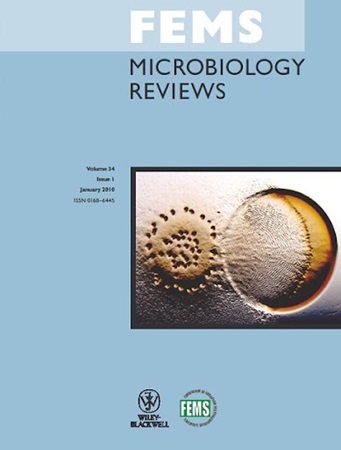探索益生菌效应分子及其在肠道免疫相互作用中的作用模式。
IF 10.1
2区 生物学
Q1 MICROBIOLOGY
引用次数: 0
摘要
益生菌是一种活的微生物,当摄入足够的量时会对健康有益,其潜在的治疗应用受到了极大的关注。益生菌的有益作用被认为源于它们增强肠道屏障功能、抑制病原体、增加有益肠道微生物和调节免疫反应的能力。然而,研究益生菌有效性的临床研究产生了相互矛盾的结果,这可能是由于使用的益生菌种类和菌株种类繁多,控制所需数量的活微生物的挑战,以及益生菌中生物活性物质之间的复杂相互作用。细菌细胞壁成分,即效应分子,在介导益生菌和宿主受体之间的相互作用中发挥着至关重要的作用,从而激活有助于健康促进作用的信号通路。先前的综述广泛涵盖了不同的益生菌效应分子,强调了它们对免疫稳态的影响。了解每种益生菌成分如何在分子水平上调节免疫活性,可能有助于在未来的临床研究中预测免疫结果。在这篇综述中,我们对益生菌效应分子的结构和免疫学特征进行了全面的综述,主要集中在乳酸杆菌和双歧杆菌上。我们还讨论了该领域目前的差距和局限性,并提出了未来研究的方向,以增强我们对益生菌介导的免疫调节的理解。本文章由计算机程序翻译,如有差异,请以英文原文为准。
Exploring probiotic effector molecules and their mode of action in gut-immune interactions.
Probiotics, live microorganisms that confer health benefits when consumed in adequate amounts, have gained significant attention for their potential therapeutic applications. The beneficial effects of probiotics are believed to stem from their ability to enhance intestinal barrier function, inhibit pathogens, increase beneficial gut microbes, and modulate immune responses. However, clinical studies investigating the effectiveness of probiotics have yielded conflicting results, potentially due to the wide variety of probiotic species and strains used, the challenges in controlling the desired number of live microorganisms, and the complex interactions between bioactive substances within probiotics. Bacterial cell wall components, known as effector molecules, play a crucial role in mediating the interaction between probiotics and host receptors, leading to the activation of signaling pathways that contribute to the health-promoting effects. Previous reviews have extensively covered different probiotic effector molecules, highlighting their impact on immune homeostasis. Understanding how each probiotic component modulates immune activity at the molecular level may enable the prediction of immunological outcomes in future clinical studies. In this review, we present a comprehensive overview of the structural and immunological features of probiotic effector molecules, focusing primarily on Lactobacillus and Bifidobacterium. We also discuss current gaps and limitations in the field and propose directions for future research to enhance our understanding of probiotic-mediated immunomodulation.
求助全文
通过发布文献求助,成功后即可免费获取论文全文。
去求助
来源期刊

FEMS microbiology reviews
生物-微生物学
CiteScore
17.50
自引率
0.90%
发文量
45
审稿时长
6-12 weeks
期刊介绍:
Title: FEMS Microbiology Reviews
Journal Focus:
Publishes reviews covering all aspects of microbiology not recently surveyed
Reviews topics of current interest
Provides comprehensive, critical, and authoritative coverage
Offers new perspectives and critical, detailed discussions of significant trends
May contain speculative and selective elements
Aimed at both specialists and general readers
Reviews should be framed within the context of general microbiology and biology
Submission Criteria:
Manuscripts should not be unevaluated compilations of literature
Lectures delivered at symposia must review the related field to be acceptable
 求助内容:
求助内容: 应助结果提醒方式:
应助结果提醒方式:


